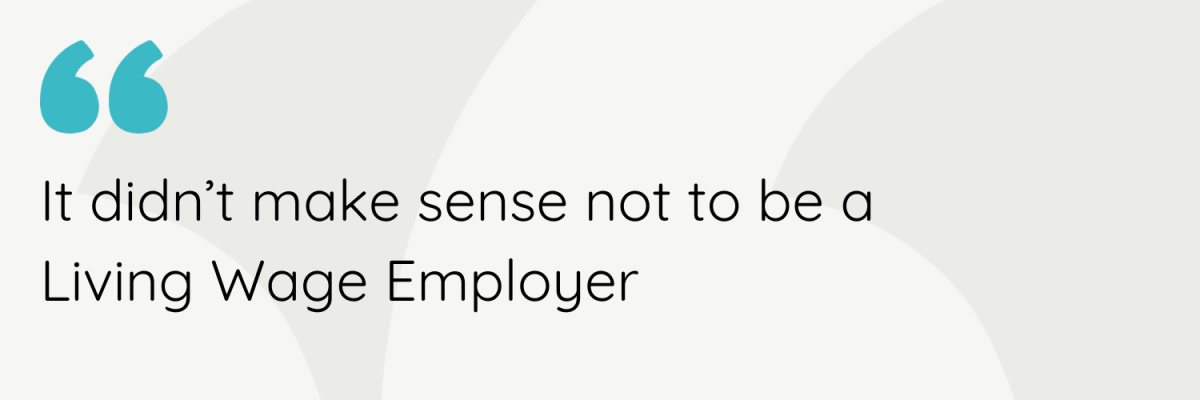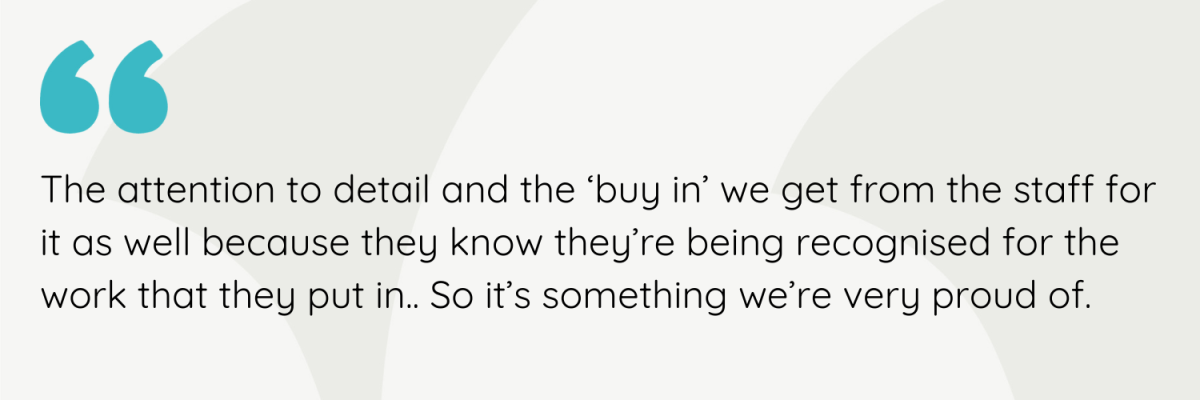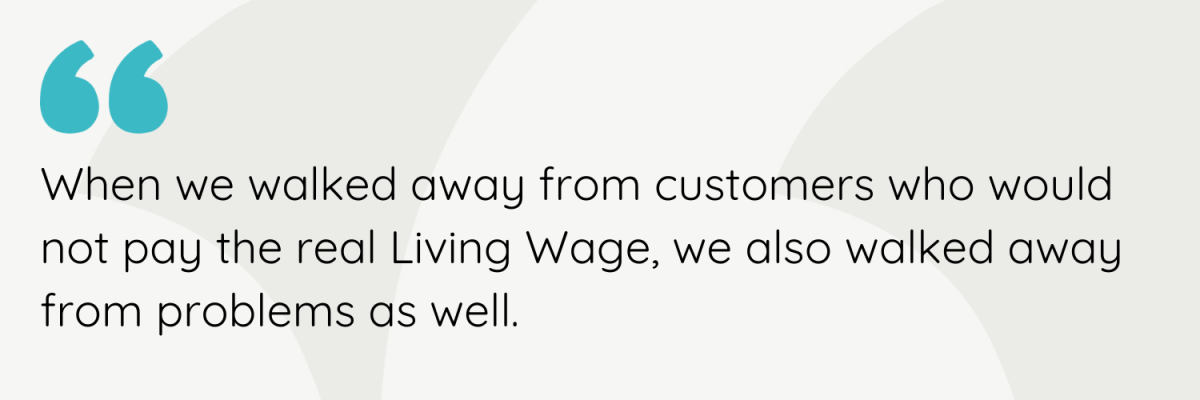Capital Cleaning Service: Why a Recognised Service Provider decided to become a Living Wage Employer

Capital Cleaning Service were first accredited as a Recognised Service Provider, working with the Living Wage Foundation. However in May 2024, they were able to become a real Living Wage Employer. In recent years they’ve been on a journey, from the majority of their contracts only paying the government’s National Living Wage, to making the decision to only offer contracts that required the real Living Wage.
We spoke to Managing Director Moreland, Accounts and Operations Coordinator Alison and Isaac, their Office Manager, about their process of transitioning from a Recognised Service Provider to a Living Wage Employer, what sparked this change, and the challenges faced along the way.
Moreland explains that he bought Capital Cleaning Services in 2015:
When we started, it was a quarter of a million turnover and 40 staff. It’s now grown to 2.4 million turnover with about 180 staff less than a decade later.
We were looking to build the business just as Covid-19 struck but I felt something was missing in the business. I felt that when we were going for public tenders, it was a race to the bottom. There was nothing differentiating us from anyone else.

Then I realised, we’re paying people the lowest we can. I began to understand why someone would say that they didn’t want to do this job. So I started asking questions about the real Living Wage. At the time, to meet the requirements of being a Registered Service Provider, we needed to make sure everyone within Head Office was on the real Living Wage. We could then offer two options to our new clients, one including the real Living Wage. We would say “we would love for you to take the real Living Wage, and here’s the benefit”. And we had a lot of clients that said “yeah okay, we understand that and we’ll work with you on that”. We also had some clients that were Living Wage Employers, so that was an easy one. It helps them on their journey, so that was great.
When we became a Recognised Service Provider and started offering those two contracts, at one point we had some cleaners who were paid the real Living Wage in one contract but when they went across the road and were doing another job, they were paid the minimum wage. Again when they worked at the weekend they were paid above the real Living Wage, so it was unpredictable and inconsistent.
We found it hard giving clients two options, and trying to encouragethem to take the one that guarantees a real Living Wage. And then when they take the lower paid one, trying to keep that enthusiasm going because of course we wanted them to go for the real Living Wage contract. So that was a bit of a transition period for us, but we also had to accept that people had budgets and that’s what they work towards, it simply wasn’t possible in every client’s case.

Reflecting on the jump from Recognised Service Provider to accredited Living Wage Employer. Moreland goes on to say:
“Eventually it was the financial arm of the business that was saying “this is not making sense”. We were winning contracts based on the real Living Wage and making the appropriate profit margins, so we decided that this is the route that we wanted to go.
In July or August last year we made a decision; we still had some contracts that weren’t in line with our values and we told these clients we’re moving to a real Living Wage. We just want to tell you we are going to do this, so this is what your cost will now be. Some clients said they weren’t happy but would still use us, but we had others who said, no that’s not our game plan.
We did have a couple of customers who literally said “we can’t have you on the real Living Wage due to the fact that we don’t pay our staff the real Living Wage and that will cause a disparity. Our staff will recognise that the person who is cleaning up after them will be paid more than them”. And for about six months I accepted that, and then I thought, why am I allowing other business models that are wrong? Why am I allowing them to stop us achieving what we want to achieve? Is there a different way that I can approach this?
So I said to this customer, you’ve awarded us the contract for three years. There’s a budget there. We are not affecting that budget, but we are looking at a different way of delivering that service for the same amount of money We managed to work out a way for the company was getting the same cost coming in, and they were still happy with the delivery of the service.
All of a sudden, the barriers that we had in our mind, that we felt we couldn’t do it, weren’t there anymore. We just looked at different ways of getting around it. It felt like when you’ve got a river going down and you’ve got some of the stream getting blocked by boulders, the water will naturally find another way of getting down.
Moreland says paying the real Living Wage to his staff has made a real difference to business:
When people weren’t paid the real Living Wage, there was a higher turnover of staff and even clients We used to have staff who would leave us on the basis of another company offering them more money.
Alison agrees: In the industry you can be replacing people every other day, and my previous experiencing was that. But we have long-standing staff. People have been with us from one to ten years and are really happy. The attention to detail and the ‘buy in’ we get from the staff for it as well because they know they’re being recognised for the work that they put in. So it’s something we’re very proud of.

When we are advertising jobs and we put the payment as £12 per hour (the current Living wage rates at time of writing this), the level of response we get is huge. We were sifting through a lot of applicants. Which you wouldn’t have seen so much before when they were advertised on the National Minimum Wage. So it’s good for us in the sense that we get to pick the best people for the role, and quality of our service is the thing that we differentiate ourselves on compared to other small and medium sized commercial cleaning organisations.
Isaac thinks another benefit is more unity within the organisation:
I think there’s a better workplace atmosphere between the cleaners. Now everyone’s on a level playing field with wages and everything. I think we’ll just continue to see that instead of there being differences with pay and client sites.
Moreland adds: The other thing we’re very proud of is that even in the last six months our payroll has been running things a lot smoother. It’s not just paying people, it’s paying them correctly and on time. All of that is part of how we get the staff members embedded with us, as an employee.

Moreland explains that implementing the real Living Wage has also encouraged them to have broader conversations about pay parity and pay equality:
We needed to make sure that there is pay parity, in terms of gender equality and that we had everybody on the right scales and I think implementing the real Living Wage has made us have the conversations that we needed to. Money is not a dirty word, or a dirty subject or taboo. It’s not a reflection on a person’s motivation. It’s an indication of where we are in this world. So having these discussions from that low level has enabled it to blossom in the rest of the business and that’s made things a lot easier for conversations around the business.
When asked what they would say to others in the cleaning industry, Capital Cleaning Services recognise that offering the real Living Wage is the right thing to do, even it it’s not easy.
To other organisations in the cleaning industry, Moreland says:
When we walked away from customers who would not pay the real Living Wage, we also walked away from problems as well. We’ve now got a happier client base as well.

It hasn’t been an easy road though because we have literally lost work and we’ve lost tenders particularly in public procurement. If I look at any contracts and there is a 60 or 70% base on the wage, I don’t go for it because it’s a real race to the bottom. I was also a little surprised that sometimes there is a public procurement contract that would say that. They say they’re looking for quality but then when you look through the documentation they’re really looking for the best value in monetary terms. And we’ve also had some large customers that have pulled away from us because we kept on pushing.
You do also need to look at the financial stability of the business, and what is a realistic margin. That is making the business viable for the future as well. So, it’s about having the right people around the table to have that conversation about how we move forward. But I certainly encourage it.
Alison agrees: Yes, it’s the right thing to do. And if you want to deliver a quality service, if you want to retain your client base and not be constantly fighting for new business, it’s the right thing to do.
We recognise that this business is about people, and it’s about the people who work for us. So you want to have the best people in place with the right skill sets. You’re not going to get that unless you’re willing to keep them motivated and allow them to live.

